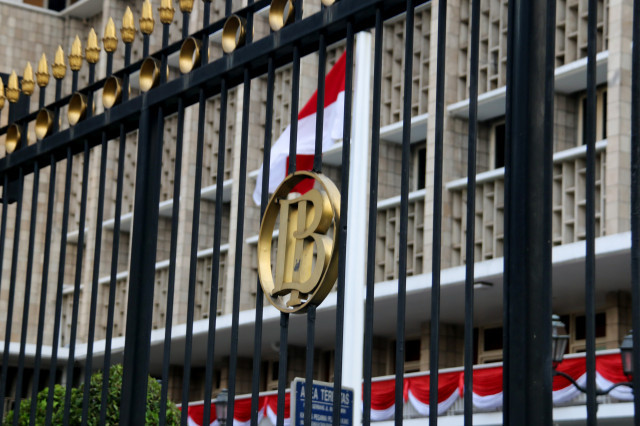Popular Reads
Top Results
Can't find what you're looking for?
View all search resultsPopular Reads
Top Results
Can't find what you're looking for?
View all search resultsHouse drops BI Law amendment, opts for omnibus finance bill
“The amendment of the BI Law has been dropped,” House Commission XI and Legislative Body (Baleg) member from the Indonesian Democratic Party of Struggle (PDI-P), Hendrawan Supratikno, told the Post on Monday. “We are currently focusing on financial sector reform.”
Change text size
Gift Premium Articles
to Anyone
T
he House of Representatives has dropped deliberation of a bill that would amend the prevailing Bank Indonesia (BI) Law, three lawmakers have said, as the House shifts focus to an omnibus bill on the financial sector to strengthen the country’s financial system.
The omnibus bill includes some of the regulations previously stipulated in the BI bill, such as mandating the central bank to pursue economic growth and employment, on top of its current mandate to maintain the rupiah exchange rate and price stability, according to a draft dated Nov. 20 obtained by The Jakarta Post.
The bill stipulates that BI will have the duty to determine and implement monetary policy sustainably, consistently and transparently while taking “into account the government’s economic policy”, and to manage and maintain payment systems and to make and implement macroprudential policy in the banking industry in line with the policy-making decisions taken by the Financial System Stability Committee (KSSK).
The KSSK is led by the finance minister and comprises the BI governor, the Financial Services Authority (OJK) chairman and the Deposit Insurance Corporation chairman.
The bill further stipulates that BI will retain its independence in the first two matters, except for specific issues ruled out by the bill.
“The amendment of the BI Law has been dropped,” House Commission XI and Legislative Body (Baleg) member from the Indonesian Democratic Party of Struggle (PDI-P), Hendrawan Supratikno, told the Post on Monday. “We are currently focusing on financial sector reform.”
A Baleg meeting last week had yet to decide on whether to cease the BI bill’s deliberation but six out of nine party factions have agreed to discontinue it.
The proposed revised BI bill had called for the central bank to be in charge of economic growth and employment, supervising banking activities, as well as involving government officials during monetary policy meetings, among other provisions.
The proposed bill caused concern in the financial markets as analysts expressed worries that it could curtail the central bank’s independence and lead to continued debt monetization going forward, resulting in a depreciation of the rupiah against the United States dollar. The rupiah on Monday slid 0.21 percent to Rp 14,210 per dollar.
A BI spokesman did not respond to the Post’s request for a comment on Monday.
The proposed omnibus bill says BI will be given the authority to regulate foreign exchange repatriation and conversion for Indonesian residents to maintain macroeconomic stability, as well as providing private companies with access to financing by repurchasing their government bonds through commercial banks to anticipate and contain any financial crises.
It is also proposed in the bill that the central bank could have the permanent authority to buy government bonds from the primary market or at auction, again to anticipate and contain any financial crises, following a law issued earlier this year that stipulates BI’s authority to do so only in response to the coronavirus pandemic.
The prevailing BI Law does not allow the central bank to directly buy government bonds at auction.
The omnibus bill also mandates the establishment of a banking supervision forum, whose members include officials from the central bank, the OJK and the LPS, to assess overall banks’ performances.
Lawmakers are currently debating whether to return banking supervision back to the central bank from the OJK and are looking into several policy options available, according to two other lawmakers contacted by the Post.
In addition, the bill also stipulates the establishment of two “supervisory councils” to supervise, assess and improve the central bank’s and the OJK’s performances and accountability. Each council will have five members appointed by the House and the president. The councils, however, will not be allowed to attend BI board of governors or OJK board of commissioners meetings.
The lawmakers speaking to the Post said the omnibus bill’s provisions could still be changed depending on discussions with the government.
“Market players should respond positively as their initial concerns about a compromised central bank’s independence in decision making is no longer an issue,” Bahana Sekuritas economist Satria Sambijantoro said on Monday. “This bill should make the central bank more relevant, as addressing economic growth and unemployment have become the best practice in the world.”
Meanwhile, Bank Permata economist Josua Pardede said the omnibus bill would allow BI to become more flexible in deciding its policy rate and would align the central bank’s policies with those of the government.
“The bottom line is that BI’s inflation targeting policy is being modified to address growth and unemployment,” he said. “However, Indonesia’s economic growth and unemployment data announcements usually lag behind. This will make BI’s policy rate decision less optimal.”
He also raised concerns over whether the supervisory councils were needed to supervise the central bank and the OJK. “We do not see the urgency of supervising BI as it could potentially be inefficient and unproductive.”










